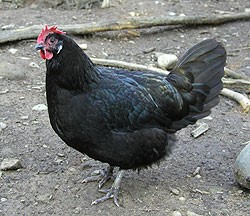Minorca Chickens
were developed to be an egg laying bird. While their egg-laying has slowed
since there original conception, they're still exceptional layers. While not
specifically bred to be dinner birds, you can still get a decent meal out of
them. There is also a small version of the Minorcas that tends to be more
popular within the show circuit.
Minorcas are
known to be flighty birds that don't generally make great pets. In addition,
the males are typically fairly aggressive and can't be kept together without
fighting. This is only really with other chickens though, so don't worry about
handling them too much. They don't particularly like being confined, so a large
run would be a great for their active nature.
Minorcas are
sometimes called the “Red Faced Black Chicken” because they are large black
chickens with red faces. They have large red wattles and singular large red
combs that tend to flop to the side. Some do have rose combs as well. Their
ear-lobes, however, are white. They have full feathered tails that are carried
low. Their bodies are covered in a single color of feather most of the time,
typically the iconic black that the breed has come to be known for.
Minorcas are
powerful jumpers, a quality they take advantage of frequently. They can even
get an added boost by flapping their wings despite their relatively large size,
so if you plan on keeping Minorcas, you'll need a larger fence to prevent
escapes. Also, their larger combs and wattles can freeze during winter, so they
need warm coops to avoid this.

